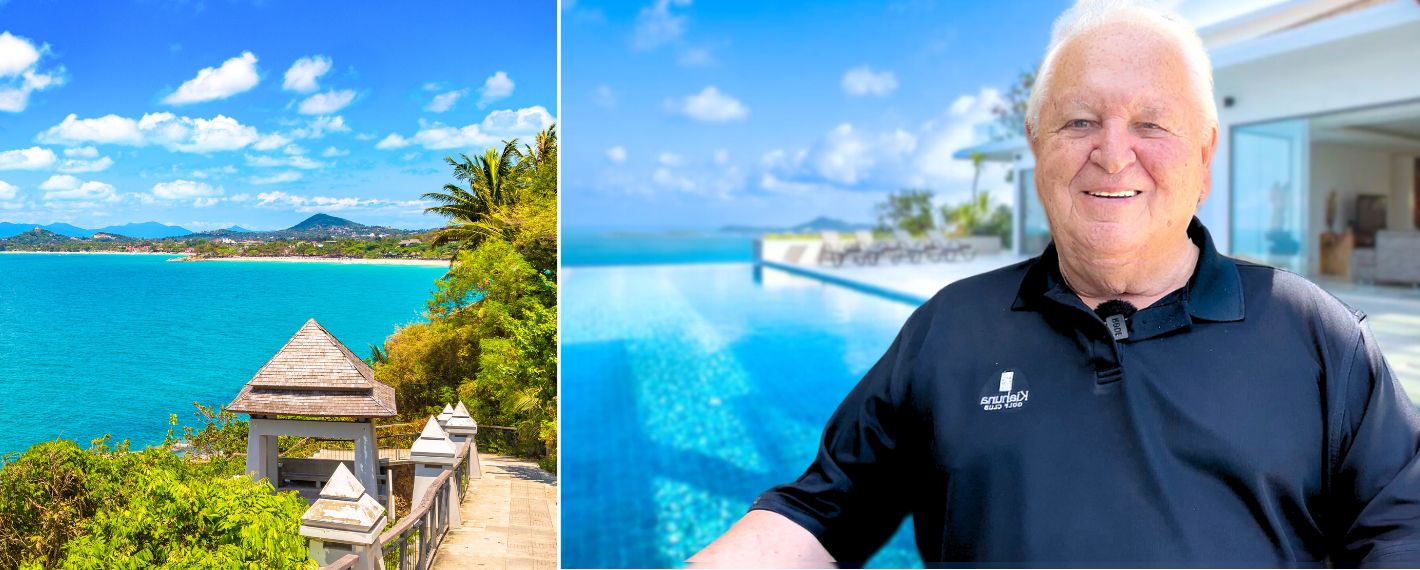This Australian's Retirement Life on Koh Samui

Every so often, I like to step away from the 'technical guides' and share real stories from expats who've actually made the move to Thailand.
Today, I want you to meet Pete.
Pete was 68 when he decided the New Zealand winters had gotten too long. After a lifetime managing hotels, and eventually owning four in California, he'd retired to the beachside town of Mount Maunganui. Beautiful place, but you needed a wetsuit to swim most of the year. For someone who'd fallen in love with warm water during his Hawaii years, that just wasn't going to cut it anymore.
So, he spent six months traveling through Asia, methodically searching for the perfect retirement spot. Phuket didn't do it for him. Then he landed on Koh Samui.
"I recall the first time I arrived here, there was just something about it that impressed me," Pete tells me. Now approaching 80, he's built exactly the retirement he wanted, though with some calculated risks that won't work for everyone.
1) Why Samui Clicked For Him:
When I ask Pete why he chose an island over mainland Thailand, his answer is refreshingly honest.
"I could have retired to a quiet village somewhere, but what's the point? You'll have plenty of time for quiet when they put you in the box," he says with a laugh.
Pete chose Thailand's second-largest island because it offered the right balance. It's developed enough to have quality hospitals and great dining options, but hasn't been overdeveloped with high-rises. The ring road connecting the whole Island takes 90 minutes to drive around in full. Everything's accessible but still feels intimate as far as he’s concerned.
"I'd spent time in Phuket, which has nice areas, but it just didn't suit me", Pete explains. "Samui had this feeling about it. Hard to explain, but I knew it was right."
The practical benefits help too. Bangkok Airways offers Samui residents discount cards with significant savings on flights. When island fever hits, Pete can reach Bangkok, Singapore, or Hong Kong within hours. From Bangkok's international airport, onward connections are endless.
2) The Self-Insurance Decision:
Here's where Pete's story takes an unexpected turn. Eight years ago, at age 72, his health insurance company canceled his coverage. The replacement quotes came in at 300,000 to 400,000 baht annually which is roughly $10,000 to $13,000.
Pete made an interesting choice based on that: he decided to self-insure.
"I did the math," Pete explains. "That's eight years ago now. If I'd bought the insurance, at say 300,000 baht per year, that would've been 2.4 million baht. I certainly haven't spent anywhere near that."
His biggest medical expense over those eight years? Arm surgery in Bangkok to replace a plate which costed 850,000 baht. "Add in regular checkups and minor treatments, and I'm still way under what insurance would have cost," he says.
When I ask what he'd do if he was diagnosed with cancer or needed months of intensive treatment... he's frank about it.
"Financially, I'm in a position where I could endure a lot of it. But it would be scary," he admits.
At the end of the day, the self-insurance gamble is very personal. It comes down to your risk threshold, financial depth, age, and your ability to sleep at night knowing you're exposed to potentially catastrophic medical costs. Pete's comfortable with his choice because he has the resources to absorb a major hit. Someone with less financial cushion might find the same decision reckless.
Some expats self-insure successfully for decades. Others get burned by unexpected diagnoses that drain their savings. There's no universal right answer, just what works for your specific situation and what lets you enjoy your retirement without constant worry.
Bangkok Hospital Samui, Pete notes, provides excellent care regardless of how you're paying. "They bring in specialists from Bangkok regularly. The facilities and doctors are as good as any hospital I've been to."
3) Living The Island Life:
Pete's daily routine has settled into a comfortable rhythm after twelve years. Grocery shopping happens at Tops Market ("convenient but pricier"), Makro ("bulk buying, like Costco"), and specialty shops for specific needs.
"Imported items cost more. Cheese, cold cuts, anything from abroad. But local food remains very affordable," Pete says.
His social life centers around a mix of expat friends and Thai locals. Weekly dinners at Mr. Eung's restaurant have become tradition. "We've watched their family grow up. It's these relationships that make a place feel like home."
But island life has its frustrations. Pete doesn't sugarcoat the challenges. "The paperwork here can be unbelievable. And traffic during high season gets horrendous," he says. "You've got tourists on motorbikes who've never ridden before. It's frightening sometimes. There are lots of accidents."
4) The Visa Experience:
Pete handles his Non-Immigrant 'O' retirement visa renewals himself, though he acknowledges it's not for everyone. "After twelve years, I know the process. But requirements change yearly, and there's quite a bit of paperwork involved."
The 90-day reporting requirement means regular trips to immigration. "The online system rarely works reliably," Pete notes. While he's comfortable with the routine, many retirees find value in having professional help navigate Thailand's visa requirements, especially when starting out.
5) The Real Secret To Island Life:
When I ask Pete what people misunderstand about retiring in Samui, his answer cuts to the heart of successful expat life.
"You have to get involved," he emphasizes. "Learn some language, understand the culture, find activities. You can't just sit by the pool with 5 PM margaritas for 15 years and expect that to sustain you. That gets boring fast."
Pete drives around the island regularly, discovering new areas particularly in the less-developed south. He's built genuine friendships through shared interests rather than just shared foreignness.
"Getting to know both Thai people and other expats… that's what makes this work," he says.
6) Is This Your Path?
At nearly 80, Pete has zero regrets about his Samui retirement. But his path isn't for everyone.
His self-insurance strategy requires deep financial reserves many retirees don't have. His comfort with Thai bureaucracy comes from twelve years of experience. His contentment with island life stems from actively building community rather than expecting it to happen automatically.
"I've never had second thoughts about the decision," Pete tells me as we wrap up. "It's been a dream retirement. Just fabulous, really."
Pete's story shows that successful retirement in Thailand, whether on an island or the mainland isn't about finding paradise. It's about understanding what you actually want, being realistic about the challenges, and actively building the life you envision.
For Pete, that meant landing somewhere developed enough to offer great healthcare, diverse dining options, and real activities beyond just beach lounging. It meant building genuine community with both locals and expats. And it meant having Samui as a jumping-off point to explore other part of Asia and beyond.
Your formula might look completely different. But after spending time with Pete and seeing how twelve years on this island have treated him, one thing's clear… the Samui retirement he's built is something pretty special.
When You're Ready, Here's How We Can Help:
1. Relocate to Thailand with peace of mind: We help determine which visa pathway would be best for you and then manage your entire application from start to finish. No paperwork headaches, no Embassy or Immigration stress. Even if you’re still in your home country, we’ll help get you approved efficiently and so you can start your life in Thailand with complete clarity. And when you’re ready for the rest, such as finding a place to live, setting up insurance, shipping your belongings or relocating your pets, our trusted partner network has you covered. It’s a seamless, all‑in‑one experience designed so you can focus on enjoying life in Thailand from the start.
2. Learn Thai that actually sticks: Join Teacher Fah's Thai Language Challenge. A 100-day structured program that's already helped over 900 other expats build real speaking skills they can use daily. If you'd like to see my progress after her 100-day challenge so you know what you can achieve, just watch this video here. Enrollment is limited to 50 students per cohort to ensure personal attention. If doors aren't open right now, you can join the waitlist for first access.





